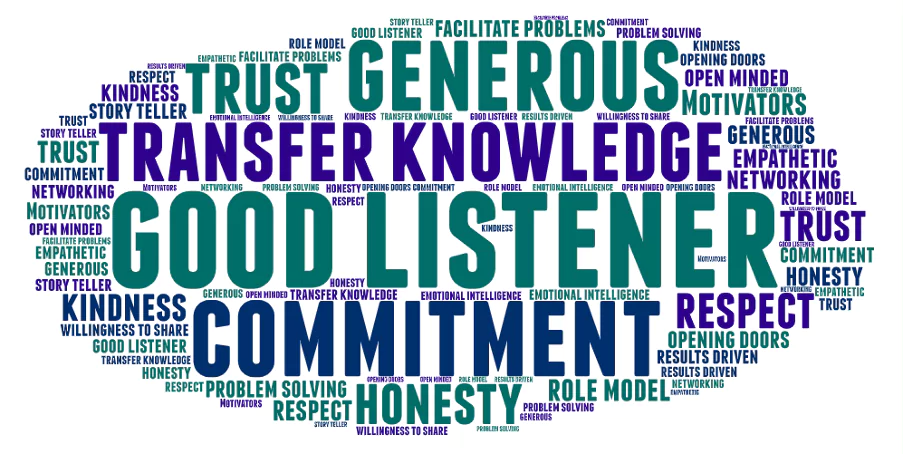This time of year (September/October) is known as the start of the academic year here in the UK. For many of our clients, it marks the start of their development year too. We are currently working with a number of organisations to train new mentors as part of a 12-month mentoring programme. One of the key things new mentors want to know is: “What makes a mentor a good mentor?” There are lots of theoretically correct answers to that question. But we prefer to keep things pragmatic. Mentoring is deeply personal. What makes someone a good mentor for one individual is not going to be the same for their colleague.
We are great believers in the power of storytelling, so we use that to explore this subject. We ask our new mentors to reflect on their experience of being mentored (formally and informally). As a group, they share their experience of what makes for a good mentor.
Although everyone has their personal views, there are some general themes as shown by this word cloud from a recent workshop.

What makes a good mentor? Here’s our top 7 characteristics:
#1 They are a good listener
The most mentioned and appreciated characteristic of a highly effective mentor is that they are a good listener. What does that mean? It means they stop talking! Not because they’re thinking about what they want to say next. But because they want to learn from what their mentee has to say. It also means they ask good open questions to encourage their mentee to think, talk and discover solutions for themselves. They not only listen with their ears; they listen with their eyes. A good mentor will pay attention and show that they have listened to what their mentee has said. They will reflect back what they have heard from their mentee’s words as well as their tone of voice and body language.
#2 They are committed to the mentoring relationship
Mentoring is not a “when I get time” job. It relies on making time to meet and that requires dedication and commitment much like any other job. Unless both parties are committed to making it work, the relationship will not grow and develop into full fruition. Mentoring also requires energy to listen, engage and guide. While the focus is on the mentee discovering solutions for themselves, a good mentor needs to put in the effort to help that happen. That means dealing with the ups and downs that come into play when someone is trying to think through an important decision.
#3 They are generous
A person’s decision to be a mentor needs to come from a place of generosity. Good mentors take pleasure from seeing their mentee grow and develop. They are generous with their time. They are also generous with their attention. And they are generous with their praise. A great mentor wants their mentee to succeed, and he or she will actively support their success with words and actions. They will never be envious or feel threatened by their mentee’s growth. They will congratulate them on their triumphs and help them recover from setbacks. The generous mentor will make connections or offer resources that could be useful to their mentee whenever he or she can. Most important, a generous mentor believes in their mentee’s potential, and works with them to help them realise it.
#4 They share knowledge and experience
A good mentor shares their knowledge and experience so their mentees can learn from them. And they share it willingly and with enthusiasm. The mentee can then apply those lessons to their own situation. That knowledge may be related to the role, the function, the organisation or the industry. Or it may be real world knowledge on how to advance in a career, based on the mentor’s own professional experiences.
Mentors can also help mentees identify gaps in their skill set so they develop the skills they need to succeed. For example, a mentee may have always been terrified of public speaking and shied away from those opportunities. Having a mentor’s encouragement can motivate the mentee to develop their public speaking skills and achieve new goals in the process.
#5 They are trustworthy
One characteristic that can make or break a mentoring relationship is trust. Trust is about loyalty. It is about openness, mutual sharing and respect, as well as the willingness to be vulnerable. A good mentor will be open about their mistakes, their weaknesses and their failures. By doing so, they make themselves more approachable while also sharing the lessons they learned. A good mentor will keep their promises, especially in relation to confidentiality. When a mentee trusts that what they share will never become gossip for the mentor, they can be more open and vulnerable.
A good mentor will recognise the importance of trust and have a conversation about it with their mentee. They will talk about what trust is, and what it means to each of them, sharing their expectations and experiences.
#6 They are honest
Whilst sometimes we don’t wish to hear the truth, a fantastic mentor will always be honest with their mentee. They give honest and direct feedback in a way that’s kind and constructive. They say what they think their mentee needs to hear to help them recognise areas where they need to grow. And they do it in a way that provides useful, honest guidance while ensuring their mentee takes ownership for their decisions and actions.
#7 They earn respect
A good mentor treats people with respect and is interested in building relationships. Their focus is on helping and developing their mentee, not on personal gain. They are emotionally intelligent, empathic and non-judgemental. And they never have a hidden agenda.
In our training we focus on how our mentors can demonstrate these characteristics and others through their actions and behaviours. Find out more about all our mentoring programmes and our Mentoring For Success Programme specific for training new mentors to become great mentors.
You may also like to download our free eBook M-Power. A Practical Guide to Mentoring in the Workplace.




1 thought on “7 Characteristics of Highly Effective Mentors”
Thank you – very useful information to a new mentor to be!